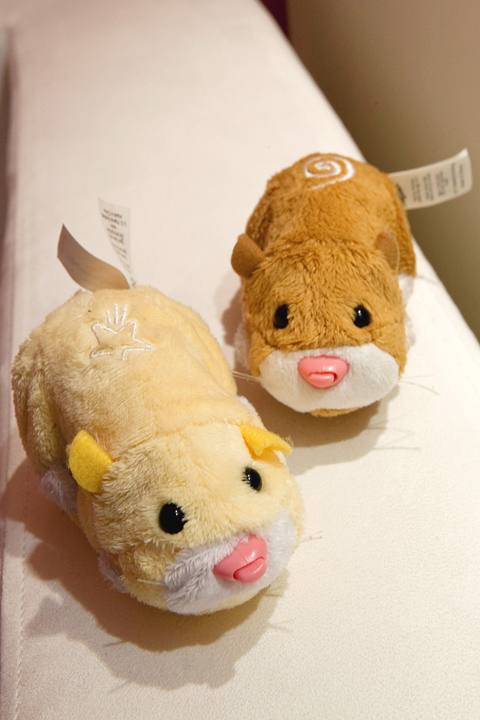A US consumer group contends one of the holiday season’s must-have toys is unsafe.
But the maker of the robotic Zhu Zhu Pets hamsters defended its product on Saturday against a study by San Francisco-based GoodGuide that said higher-than-allowed levels of the chemical antimony were found in the toy.
GoodGuide named Zhu Zhu Pets hamsters one of the top-selling toys with low ratings after finding antimony, which can cause health problems, on the hair and nose of one of the toy hamsters, called Mr Squiggles.

PHOTO: BLOOMBERG
The group assigned the toy, aimed at three to 10-year-olds, a rating of 5.2 on a 10-point scale.
But the toy’s maker, St Louis-based Cepia LLC, insisted in a statement that its product is safe and has passed rigorous testing.
The company said it was contacting GoodGuide to share its testing data and determine how the report was founded.
“I have been in the toy industry for more than 35 years, and being a father of children myself, I would never allow any substandard or unsafe product to hit the shelves,” Russ Hornsby, Cepia’s CEO, said in the statement.
Zhu Zhu Pets, which retail for about US$10, have become this season’s toy craze, following in the footsteps of Tickle Me Elmo and Cabbage Patch Kids. The items fetch US$40 or more on resale Web sites like eBay and Craigslist.
That’s what brought them to GoodGuide’s attention. GoodGuide CEO Dara O’Rourke said on Saturday that his group bought three of each of the year’s 30 hottest toys and tested them multiple times.
Antimony was measured at 93 parts per million in the hamster’s fur and at 106 parts per million in its nose. Both readings exceed the allowable level of 60 parts per million, said O’Rourke, an associate professor of environmental science at the University of California, Berkeley.

Nvidia Corp yesterday unveiled its new high-speed interconnect technology, NVLink Fusion, with Taiwanese application-specific IC (ASIC) designers Alchip Technologies Ltd (世芯) and MediaTek Inc (聯發科) among the first to adopt the technology to help build semi-custom artificial intelligence (AI) infrastructure for hyperscalers. Nvidia has opened its technology to outside users, as hyperscalers and cloud service providers are building their own cost-effective AI chips, or accelerators, used in AI servers by leveraging ASIC firms’ designing capabilities to reduce their dependence on Nvidia. Previously, NVLink technology was only available for Nvidia’s own AI platform. “NVLink Fusion opens Nvidia’s AI platform and rich ecosystem for

‘WORLD’S LOSS’: Taiwan’s exclusion robs the world of the benefits it could get from one of the foremost practitioners of disease prevention and public health, Minister Chiu said Taiwan should be allowed to join the World Health Assembly (WHA) as an irreplaceable contributor to global health and disease prevention efforts, Minister of Foreign Affairs Lin Chia-lung (林佳龍) said yesterday. He made the comment at a news conference in Taipei, hours before a Taiwanese delegation was to depart for Geneva, Switzerland, seeking to meet with foreign representatives for a bilateral meeting on the sidelines of the WHA, the WHO’s annual decisionmaking meeting, which would be held from Monday next week to May 27. As of yesterday, Taiwan had yet to receive an invitation. Taiwan has much to offer to the international community’s

CAUSE AND EFFECT: China’s policies prompted the US to increase its presence in the Indo-Pacific, and Beijing should consider if this outcome is in its best interests, Lai said China has been escalating its military and political pressure on Taiwan for many years, but should reflect on this strategy and think about what is really in its best interest, President William Lai (賴清德) said. Lai made the remark in a YouTube interview with Mindi World News that was broadcast on Saturday, ahead of the first anniversary of his presidential inauguration tomorrow. The US has clearly stated that China is its biggest challenge and threat, with US President Donald Trump and US Secretary of Defense Pete Hegseth repeatedly saying that the US should increase its forces in the Indo-Pacific region

ALL TOGETHER: Only by including Taiwan can the WHA fully exemplify its commitment to ‘One World for Health,’ the representative offices of eight nations in Taiwan said The representative offices in Taiwan of eight nations yesterday issued a joint statement reiterating their support for Taiwan’s meaningful engagement with the WHO and for Taipei’s participation as an observer at the World Health Assembly (WHA). The joint statement came as Taiwan has not received an invitation to this year’s WHA, which started yesterday and runs until Tuesday next week. This year’s meeting of the decisionmaking body of the WHO in Geneva, Switzerland, would be the ninth consecutive year Taiwan has been excluded. The eight offices, which reaffirmed their support for Taiwan, are the British Office Taipei, the Australian Office Taipei, the